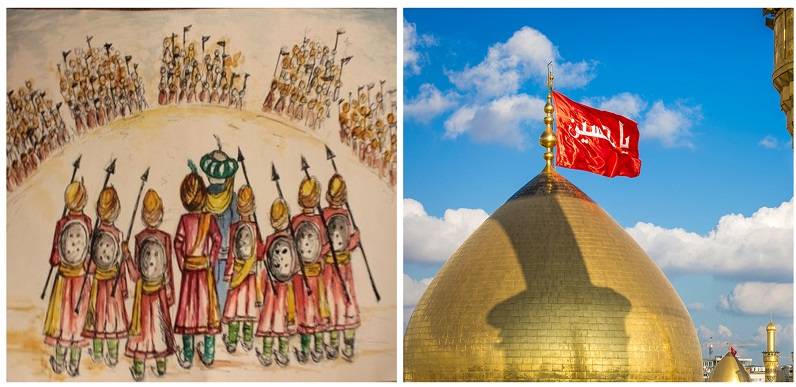
Not many people know about the ‘Hussaini Brahmins’ and some may be shocked to read how titles from two different religions can be aligned together. But there is a history to it which is as beautiful as it gets because it is an example of interfaith harmony and pluralism.
Rahab Singh Dutt was an influential Hindu man belonging to the Mohyal community. It is said that he went all the way to Iraq with his sons to fight alongside Imam Hussain (a.s) in the war of Karbala. The war was fought against caliph Yazeed who had challenged Husain and launched a fight against him for his refusal to plead allegiance to the caliph who Hussain thought was corrupt and unjust.
As the war began, Imam Hussain's group of companions was outnumbered by Yazeed's army. The Imam then started writing letters seeking support of the tribes and areas who had maintained good ties with his grandfather Prophet Muhammad (PBUH). One of these letters was received by the Hindu Brahmins of North-West frontier in India. Rahab Dutt then decided to go to Karbala and join the army of Husain to fight the battle against Yazeed. He took his seven sons along who were martyred in the battle of Karbala.
Sunita Jhingran, who says she is a descendant of Rahab Singh Dutt, has been quoted in multiple articles as saying that her ancestors joined Imam Husain because he was 'fighting against oppression'. “Rahab Singh Dutt was a warrior who joined the forces of the Imam since he was standing for the righteous", she says.
Imam Hussain appreciated Rahab Dutt's love for him and gave him the title of 'Sultan', asking him to return to India. After his return to India, the community adopted the title 'Hussaini Brahmins' to honour Dutt's bond with Imam Hussain.
Indian publication Pune Mirror quoted Colonel Ramsarup Bakshi (retd), who is a member of the Hussaini-Brahmin community, as saying that people are surprised when he introduces himself as a Hussaini Brahmin. “The employees in the factory I run now were taken aback when I told them about my community." Bakshi also stated that his community was proud of the bond his ancestors shared with Imam Hussain, and they recall this bond on Ashura with great reverence. “We are a very, very small community in Pune, but this single piece of history is of seminal significance in our lives and binds us together, both Hindus and Muslims," he says.
Rahab Singh Dutt was an influential Hindu man belonging to the Mohyal community. It is said that he went all the way to Iraq with his sons to fight alongside Imam Hussain (a.s) in the war of Karbala. The war was fought against caliph Yazeed who had challenged Husain and launched a fight against him for his refusal to plead allegiance to the caliph who Hussain thought was corrupt and unjust.
As the war began, Imam Hussain's group of companions was outnumbered by Yazeed's army. The Imam then started writing letters seeking support of the tribes and areas who had maintained good ties with his grandfather Prophet Muhammad (PBUH). One of these letters was received by the Hindu Brahmins of North-West frontier in India. Rahab Dutt then decided to go to Karbala and join the army of Husain to fight the battle against Yazeed. He took his seven sons along who were martyred in the battle of Karbala.
Sunita Jhingran, who says she is a descendant of Rahab Singh Dutt, has been quoted in multiple articles as saying that her ancestors joined Imam Husain because he was 'fighting against oppression'. “Rahab Singh Dutt was a warrior who joined the forces of the Imam since he was standing for the righteous", she says.
Imam Hussain appreciated Rahab Dutt's love for him and gave him the title of 'Sultan', asking him to return to India. After his return to India, the community adopted the title 'Hussaini Brahmins' to honour Dutt's bond with Imam Hussain.
Indian publication Pune Mirror quoted Colonel Ramsarup Bakshi (retd), who is a member of the Hussaini-Brahmin community, as saying that people are surprised when he introduces himself as a Hussaini Brahmin. “The employees in the factory I run now were taken aback when I told them about my community." Bakshi also stated that his community was proud of the bond his ancestors shared with Imam Hussain, and they recall this bond on Ashura with great reverence. “We are a very, very small community in Pune, but this single piece of history is of seminal significance in our lives and binds us together, both Hindus and Muslims," he says.
